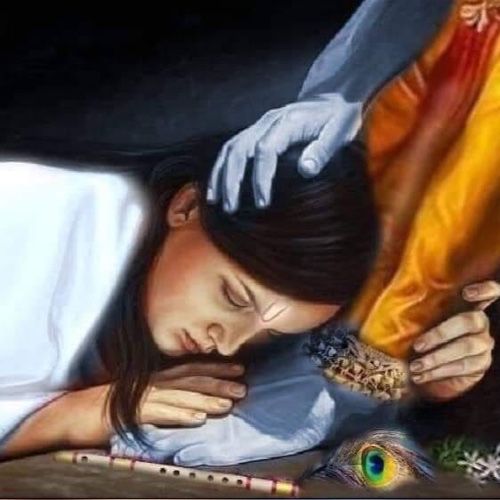Bhagwat Session 30
Shrimad Bhagavata Mahapurana
Synopsis of the Thirtieth Session
Bhagavata Chaturth Skanda (Book Four)
Chapter 24 and 25
———————————————————
The objective of Shrimad Bhagavat Mahapuran
Parsiksit to Sukhdevji
King Pariksit asks here the following two questions;
1. What should be done under all circumstances by a man who is under the verge of death?
2. What should be done by man in general - What should a mortal do at all times and under all circumstances?
- What should they hear?
- What should they repeat?
- What should they keep in their mind?
- What should they resort to?
- What should they avoid?
It is these two questions that have been answered in length in the course of the eleven books of ‘Shrimad Bhagavata Mahapuran’.
————————————————————
Chaturshloki Bhagwatam (These 4 shlokas, for our understanding have been expanded into 18000)
Brahman
I alone am, I alone was and I alone will be.
Because, we insist that the creation is real, hence, we are using ’was and is will be’, in the actual sense the Lord is beyond the realm of time and devoid of attribute.
In the beginning Lord alone was, and he is devoid of all difference. Then creation came into place and it seemed at that Lord became many, but in reality there is nothing but him even then. Then again after the dissolution only he the unchangeable will remain. He is beyond the manifest and the unmaifesjt, beyond sat and asat, beyond all tangibility and intangibility
‘Ataman alone and nothing else.’
Maya
Maya is cause of which, what is real seems unreal, was unreal seems real. What is, is hidden and what is not is revealed. Just like the world is not real, but we see it and the Atman is the only reality, which is never seen.
Eg: A mere rope can be seen as a snake, when there is not enough light. But, when the light is turned on, the truth of the rope comes forth and the fear is eliminated.
Maya itself is not real, it is just a projection, yet it dominates. Does it not?
World
The world is nothing but him, him alone and only him. we have just given him another name - The World
Can we have
- Clay pot without clay
- Gold bangle with Gold
- Waves without the Ocean
The clay pot is nothing but clay, the bangle is nothing but gold and the wave is nothing but he ocean.
The world is nothing but the Lord - Everything is in him, yet nothing is in him - It is all just an appearance.
‘The world is just a dream, let the vision cease. But, if you can not, just give love to all and service free.’
How to reach Brahman/Self
Delve deeper keeping the concept of ‘Presence and absence in mind’
Can there be
- The clay pot with out the clay
- The Gold bangle without the gold
- The waves without the ocean
There can be
- Clay without the clay pot
- Gold without the gold bangle
- Ocean without the waves
‘Analysing like this we finally reach the atman, or self. This is where analysing is not possible because it is infinite, one without a second.’
——————————————————
Shrimad Bhagavata Maha Puran, is not a ramdom compilation of stories. It has been thoughtful written keeping the flowing 10 points in mind. It is said that each book, hence forth will explain each topic and slowly bring us close to ‘Ashraye’.
Book 1 - Adhikari Skanda
Book 2 - Sadhana Skanda
Book 3 - Sarga and so on;
1. Sarga - How was this world created?
2. Visarga -How were the different species made, when all the creatures are formed out of the same tattva and the same panchbhootas?
3. Stithi - How is the world upheld and where?
4. Poshana - Who provides the life sustaining water when the earth dries up?
5. Utis - Which are the different desires that arise in peoples mind?
6. Manvantars - How is time divided?
7. Isanukatha - What is the nature of Bhaktas?
8. Nirodha - How does one control the mind, to love the Lord?
9. Mukti - What is mukti?
10. Asraya - What is the nature of that, which upholds all else?
——————————————————
Book 4, The Fourth Skanda deals with;
- Dharma
- Artha
- Kaam
- Moksha
Currently, with the story of Prachinverhi, Pracetâs and Purañjana we are going to try and understand the concept of Moksha.
———————————————————
Story: (Family tree 4 enclosed)
There was this King called Prachinverhi, who was a decedent of Prithu, he had 10 sons called the Pracetâs. In order to carry on the work of creation and procreations, he asked his sons to go and do Tapa. These sons who were pious and of good character, obeyed their father and went to the Narayan sarovar, a lake as deep and vast as the ocean. There they were blessed to have the darshan of Lord Shiva, who is reachable and more than willing to bless any devotee of Hari, just like Hari considers any devotee of Hara dearest of all.
Lord Shiva told them a long and beautiful Stuti called the ‘Yogadesha’ and said that if they recited the same every day, not only the person who is chanting but also the one who is listening will get Liberations ‘Moksha’. The Pracetâs were blessed, and went on to do there Tapa.
Narad Muni saw all this and felt that the sons have been blessed by Shivji, but Prachinverhi, who was deep rooted in rituals, was still swinging in ignorance. Feeling pity on this King, he went to share his spiritual insight and show him the path to Liberation.
King Prachinverhi was anxious to know that all the animals who he has scarified, were waiting for him with steel horns and weapons in their hands to slaughter him just like he had killed them. He had aimlessly done so many yagnas that the entire earth could be covered with the Kusa Grass he used.
When reproached by Narad for this act, he genuinely asked for direction. To which Narad Muni decided to Narrate to him the Story of a King Called Purañjana.
——————————————————
Points to ponder:
Yogadesha From Shivji to the Pracetâs
1. Blessedness - His glory gives rise to blessedness, the unfoldment of our blissful nature.
2. Only One - He is supreme Brahma in which is manifested the entire universe and who shines through the universe and is all pervading. That one supreme spirit has assumed all forms. He has manifested as all we see around us. He appears as the bodies of all living beings, as well as the cosmic body and take the form of earth. He is the door to heaven who constantly dwells in a pure heart.
3. Form less - The formless, can manifest in a divine blissful form, held in high esteem by his devotees.
4. Form - When one focus on the divine form of the formless, and that divine form is revealed it dispels fear and guide the soul wallowing in ignorance.
5. Devotion - That supreme Lord is attainable to only by him who is full of devotion, and is difficult to access to all other mortals.
6. Sat ka Sang - The enjoyment of heaven nor liberation nor the pleasures sought by mortals can be equated to the fellowship enjoyed, even for half a moment, of those who have developed an attachment for the Lord.
7. Moksha - The contemplative soul whose heart is never distracted by external objects, exceedingly pure and blessed as it is by the living devotion of such devotees easily and surely succeeds in realising his the Lords true Nature.
Narada Muni’s Spiritual guidance to King Prâcînabarhi
Narad Muni - What good O king do you seek for yourself through rituals?
King replied -
- I know not the supreme good, my mind being distracted by rituals. I pray, impart to me the pure wisdom whereby I may be freed froth shackles of Karma.
- Sticking to the life of a householder - where one performs actions prompted by interested motives. Regarding sons, wives and riches as the only object of human pursuit.
- The ignorant man fails to attain the highest good, and wanders in the path-ways leading to transmigration.
Q. Are rituals the means or the end?
Q. If they are the means, then means to what end?
Understanding Devotion
Quoting from Ramcharitra Manas - Parvati to Shiva
A wake up call
- Out of 10 million souls devoted to religion there is 1 who is averse to the pleasure of sense and takes delight in dispassion.
- Among 10 millions souls who is free from attachment, 1 succeeds in acquiring perfect wisdom
- Among 10 million enlighten souls in this world there is hardly 1 who attains final beatitude even when living.
- Among 1 thousand such souls he who has to only realised his oneness with Brahma but is rarely to be found.
- Of the religious, the unattached, the enlightened and the emancipated, as well as of those mere in the Absolute, he who takes delight in ‘Devotion’ and is free from vanity and wiles is most difficult to find.
We feel that ‘Devotion’ is the first step, but ‘Devotion’ is the ultimate state, a true Devotee is rarest of rare. Interest in spirituality needs to be developed, by constant effort. We wait for the ‘Devotional’ spike to come from somewhere and then we say we will embark.
What an Irony..
——————————————————
Lord to Brahmaji - Penance is very dear to me, and I am the essence of penance. It is by penance alone that I create this universe and through penance I maintain it and it is through penance again that I absorb it. My strength consists in Penance which is hard to practice.
Sukhdev to Parikshi - It is this penance which is the true wealth of men.
“Yamaniyam sanjama apa kiyo,
Puni tyaga virage athaga lahyo,
Vanavasa liyo mukh mauna rahyo,
Drdha asana padma lagaya diyo
Mana pauna nirodha svabodha kiyo,
hathajoga prayoga su tara bhayo….”
Tapa tapa tapa…has to be undertaken to walk further.
Many times we get agitated and defensive, and say how is it possible to give aways all our wealth. Sad, how every endeavour is associated with the material and tangible, which is not even a small part of the entire process.
Work, on the subtle, tangible mental level first. 99 % of the Tapa is internal - 1% material part of it we can deal with when the inner battle has been won.
Note:
It takes at least 10 000 to 15 000 hours of practice ‘Tapa’ to make something effortless. Only when things become effortless, we should say that the first step has been taken. Post which, nirantar-continuous ;
- Prayataan
- Prarathana
- Pratiksha
Ek pal ya ek Kalpa,
Ek sadhak phir nahin sochta.
The two mistakes that most people make is, first they don’t embark on this journey, and if they do they turn back half way.
————————————————————
The ‘Leader Thought’ that paves the way - The Leader Thought - Name of Hari
Followers will never know how hard the leader works to create the path.
The leader never complains about his hustle because he’s just trying to get where “he” wants to go.
You can get anywhere you want, if you are willing to make a path where there is none.
Jai Shri Krishna 🙏
Jai Hanuman 🙏


